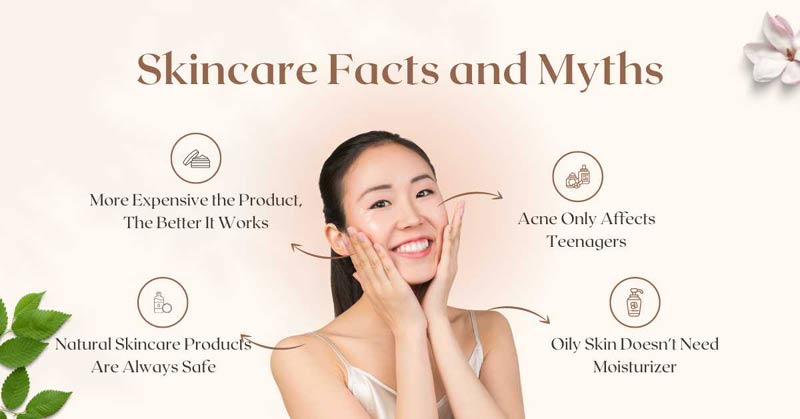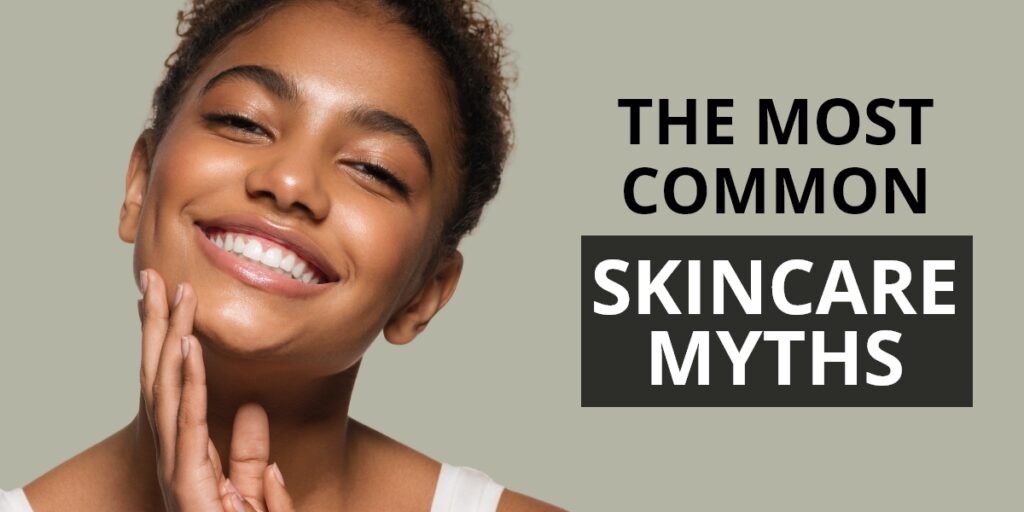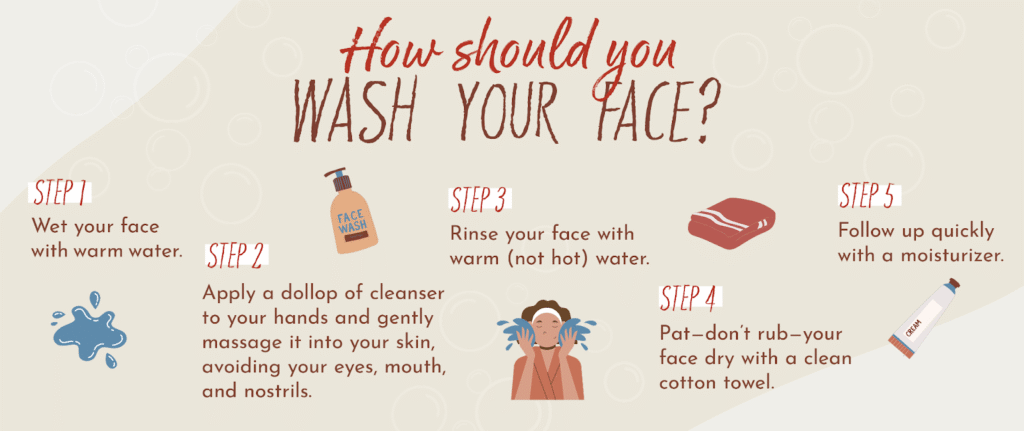
Skin care maintains the body’s largest organ by protecting it from damage, regulating balance, and supporting overall health. A consistent routine with cleansing, moisturizing, and daily sun protection preserves resilience and prevents common issues like dryness, acne, or irritation.
Key Takeaways
- Skin care is vital for protection, temperature regulation, and hydration.
- Myths like “expensive means better” or “natural equals safer” are false.
- Sunscreen is essential for all skin tones and weather conditions.
- Oily skin still needs moisturizer for balanced hydration.
- Over-exfoliation damages the skin barrier; moderation is key.
- Evidence-based habits gentle cleansing, SPF use, retinoids, and dermatologist guidance ensure healthy, lasting skin results.
Introduction to Skin Care
Skin care is essential for maintaining balance and protection. Simple, consistent routines can help your skin stay hydrated, smooth, and resilient. Since skin needs vary by age, lifestyle, and environment, adopting a structured approach is important even tailored skin care routines for men or teens
- Skin protects against environmental damage and infection
- It regulates temperature and sensation
- Skin needs vary by age, lifestyle, and environment
- Basic routine: gentle cleansing, moisturizing, and sun protection
- Adjust care to address dryness, acne, or sensitivity
- Consistency is key to healthy, glowing skin
Debunking Common Skin Care Myths
Many beliefs about skin care are widely repeated but aren’t supported by science or expert advice. Knowing what’s true helps you invest time and money smarter, and avoid mistakes that could harm your skin.

Myth: Expensive Products Are Always Better
Price doesn’t guarantee quality or results.
- Affordable brands often use the same high-quality or clinically proven ingredients as luxury products
- It’s best to focus on the ingredient list, not flashy packaging or celebrity status
- Some costly creams deliver benefits for specific issues, but usually the price reflects brand marketing more than effectiveness
Myth: Oily Skin Doesn’t Need Moisturizer
Even oily skin types need hydration to stay healthy.
- Without enough moisture, your skin may overproduce oil, making the problem worse
- Look for lightweight, non-comedogenic moisturizers that hydrate without clogging pores
- Hydration helps balance skin function for every type
Myth: Natural Ingredients Are Always Safe and Best
“Natural” doesn’t necessarily mean “safer”.
- Some natural substances, like poison ivy, can be harmful
- Essential oils can cause irritation if not properly diluted or formulated
- Lab-made ingredients are often more purified, stable, and tested for safety
- Always patch test new products before full use to check for reactions
explore natural and synthetic skincare to choose what works best for your skin.
Myth: Sunscreen is Only Needed on Sunny Days
Sun protection is essential all year round.
- UV rays can penetrate clouds, windows, and even shade
- Wearing sunscreen daily protects against skin cancer, dark spots, and premature aging
- SPF should be a daily habit regardless of weather
- Reapply after swimming, sweating, or long outdoor time
Myth: Acne Only Happens to Teenagers
Acne is not just a teen problem.
- Many adults experience breakouts due to hormones, stress, or lifestyle
- Adult acne often shows up around the jawline and chin
- It’s important to address root causes such as hormonal changes and diet
- Misusing skincare for adult acne can make it worse
Myth: Exfoliate Daily for Clear Skin
Daily exfoliation can damage your skin.
- Overdoing it harms your skin barrier, causing redness, inflammation, and more breakouts
- Limit exfoliation to once or twice a week depending on your skin
- Chemical exfoliants (like AHAs, BHAs) are gentler than physical scrubs
- If you notice irritation, stop exfoliating and adjust your routine
Ignoring redness, itching, or breakouts is one of the most common skincare mistakes. Paying attention and adjusting your routine prevents long-term damage.
Myth: Pores Can Open and Close
Pores do not have the ability to change their size at will.
- Steam or warm water does not open pores; it only loosens debris
- Genetics and oil production largely determine your pore appearance
- Cleansing, retinoids, and clay masks can reduce visible pore size
- No product makes pores physically open or close
Myth: You Need Hot Water to Clean Your Skin Properly
Hot water isn’t better for skin, in fact it can strip away natural oils.
- Lukewarm water is gentler and cleans effectively without damaging your skin
- Always moisturize after cleansing
- Extreme temperatures can compromise your skin barrier
Myth: You Should See Immediate Results From Skincare
Real skin changes take time.
- Most products need several weeks to show visible improvements
- Spot treatments may reduce redness quickly, but deeper changes occur slowly
- Patience and consistent use provide lasting results
- If your skin reacts badly, stop using the new product and seek advice
Myth: Dark Skin Doesn’t Need Sunscreen
All skin tones are at risk for damage from the sun.
- UV exposure can cause burns, premature aging, and skin cancer in any skin type
- Sunscreen should be used daily for everyone
- Physical or mineral sunscreens work well for deeper skin tones and are less likely to cause a white cast
- Sun protection prevents uneven skin tone and protects against long-term damage
Myth: Spot Treatments Cure Acne Overnight
Quick fixes are rare when it comes to acne.
- Spot treatments may decrease swelling but rarely make pimples vanish quickly
- Full routines with gentle cleansing, daily moisturizers, and targeted treatments work best
- Prevention, not just reaction, is key for clear skin
- Persistent, painful acne should be looked at by a dermatologist
Evidence-Based Skin Care Tips and Habits
Expert skin care relies on practical habits supported by research and real-world results. Following these guidelines can help everyone achieve healthier, clearer, and stronger skin.
Choose Gentle Cleansers
Harsh soaps and scrubs often strip away natural oils and disrupt your skin’s protective barrier.
- Opt for mild, non-foaming cleansers that remove dirt and excess oil without causing dryness or irritation
- If your skin feels tight or squeaky after washing, switch to a gentler product

Use Sunscreen Daily
Sun protection is the most effective way to prevent premature aging, uneven skin tone, and skin cancer.
- Apply broad-spectrum sunscreen every morning, even on cloudy or winter days
- SPF 30 or higher offers good coverage for daily exposure
- Reapply after sweating, swimming, or prolonged outdoor activities
Moisturize, Even if Your Skin Feels Oily
Hydration is important for all skin types, including oily or acne-prone skin.
- Use lightweight, oil-free, and non-comedogenic moisturizers that add water without clogging pores
- Well-hydrated skin is better able to repair itself and regulate oil production
Consider Retinoids and Vitamin C for Anti-Aging
Ingredients like retinol for skin care boost cell turnover, smooth fine lines, and help treat acne. Vitamin C brightens skin and reduces oxidative stress.
- Retinoids (including retinol) boost cell turnover, smooth fine lines, and treat acne
- Vitamin C acts as an antioxidant, brightens skin, and helps fade spots
- Start with low concentrations to build tolerance and reduce irritation
Listen to Your Skin’s Reactions and Adjust Accordingly
Your skin speaks through redness, irritation, dryness, or breakouts.
- Pay attention to changes after starting new products or routines
- If things worsen, reduce use or discontinue the product
- Choose simple routines; more isn’t always better
Consult with a Board-Certified Dermatologist if Unsure
Professional advice helps you navigate confusing or persistent skin problems.
- Seek medical guidance for serious concerns like cystic acne, chronic redness, or unexplained rashes
- Dermatologists can recommend proven treatments tailored to your specific needs
- Regular checkups also help monitor skin health and identify early signs of conditions
Conclusion
Many popular skin care beliefs are misleading and can actually harm your skin in the long run. Expensive products do not guarantee better results focus on key ingredients, not brand or price. Even oily skin needs moisturizer to maintain healthy hydration. Natural ingredients are not always safer, and patch-testing new products is important. Sun protection is vital for all skin types, every day, regardless of weather or skin tone.
Adult acne is common and linked to hormones and lifestyle, while over-exfoliation can damage your skin barrier. Pores cannot open or close at will, and hot water is not better for cleansing. Sustainable improvement comes with patience; there are no overnight fixes. Evidence-based habits like gentle cleansing, daily sunscreen, appropriate moisturizers, use of retinoids or vitamin C, and dermatologist guidance are essential for healthy, resilient skin.
FAQs
Is there a single best skincare routine for everyone?
No. Routines should be tailored to individual skin type and concerns.
Are expensive products always more effective?
Not always. Many budget options work as well as luxury brands.
Are “natural” ingredients always safe for skin?
No. Even natural ingredients can cause irritation or allergies.
How often should sunscreen be used?
Daily, with reapplication every two hours if outside.
Is exfoliating every day harmful?
Yes, over-exfoliation can damage skin. Limit to one to three times per week.
Do pores open and close?
No. Pore size is mostly genetic and cannot change permanently.
Can acne be cured overnight?
No. Spot treatments may reduce swelling but real improvement takes time.
Does dark skin need sunscreen?
Yes. All skin needs protection from the sun.
How long before I see results from new products?
Usually four to eight weeks with consistent use.
How do I know if a skincare myth is false?
Look for scientific evidence, dermatologist recommendations, and peer-reviewed research.
Reference
- ommon skin care myths debunked with scientific evidence and expert advice:
https://www.health.harvard.edu/womens-health/dont-fall-for-these-skin-myths
https://www.mydcsi.com/2024/02/29/debunking-skin-care-myths-separating-fact-from-fiction/
https://www.apollo247.com/health-topics/skin-disorder/7-common-skincare-myths-busted - Expensive vs affordable skin care product effectiveness:
https://www.exoceuticals.com/blogs/the-journal/10-skincare-myths-debunked
https://krxaesthetics.com.au/blogs/articles/cheap-vs-high-end-skin-care-does-it-matter
https://www.perfectpointindia.com/are-expensive-skincare-products-worth-it-the-truth-revealed
https://truskin.com/blogs/general/why-affordable-skincare-can-be-just-as-effective-as-the-expensive-stuff - Risks and considerations of natural skin care ingredients:
https://health.clevelandclinic.org/natural-skin-care
https://rfsadermatology.com/the-pros-and-cons-of-using-natural-skin-care-products
https://www.apollo247.com/health-topics/skin-disorder/7-common-skincare-myths-busted - Importance of sunscreen protection every day, regardless of weather:
https://www.earthraga.com/blogs/news/skin-care-myths
Autum Harkins is a CNS with an MS in Clinical Nutrition from Maryland University of Integrative Health (2017) and 8 years in integrative clinics. She develops individualized protocols for deficiencies, digestive health, and women’s wellness, prioritizing third-party-tested supplements. Autum contributes to case series and webinars and mentors practitioners on lab interpretation. Credentials: CNS Board (ANA/BCNS) number, state nutrition licensure where applicable, and professional memberships with links.

